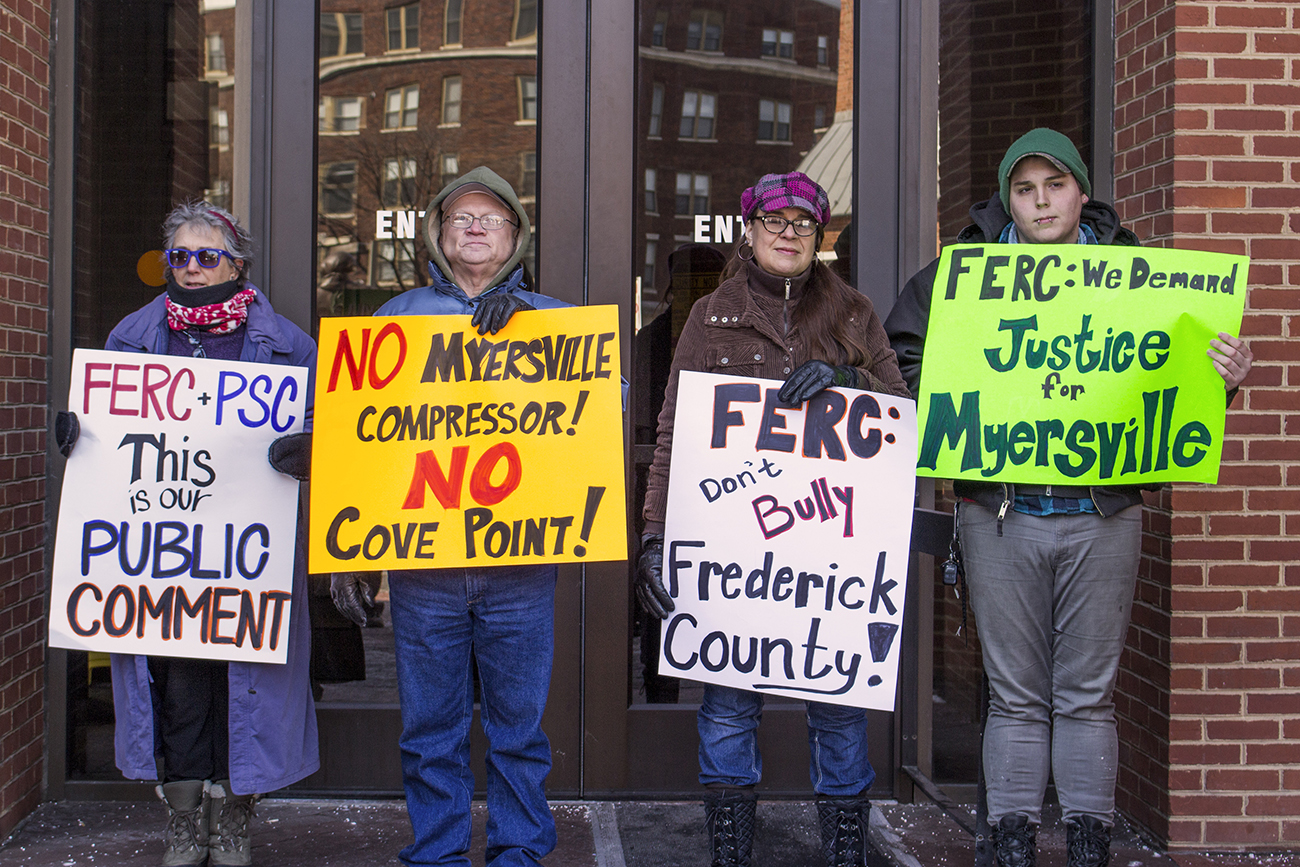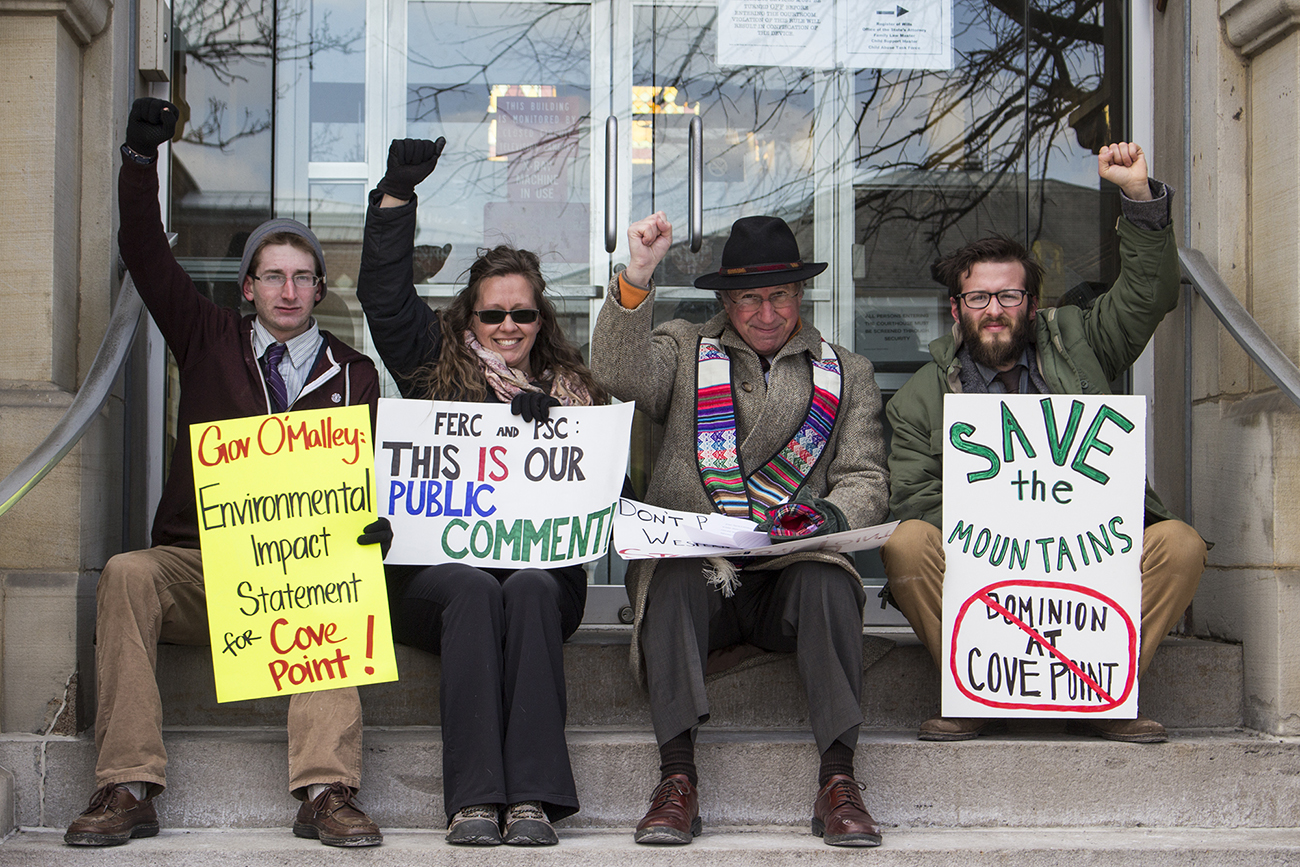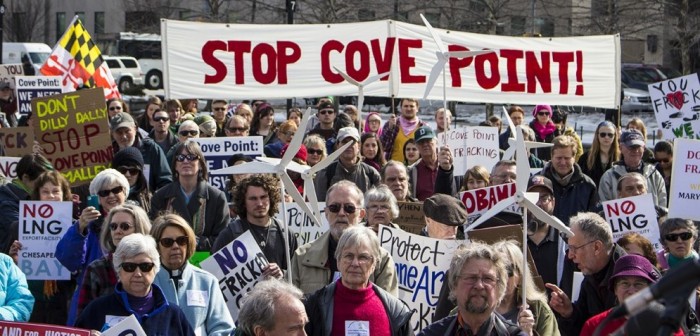Today marks the third group of arrests in a series of peaceful Cove Point protests that have crossed Maryland — from Cumberland to Frederick to Calvert County — over the past few weeks. Six Maryland residents were peacefully arrested today outside the Calvert County courthouse in Prince Frederick protesting Virginia-based Dominion Resources’ plan to build its Cove Point liquefied natural gas export facility in nearby Lusby. The protesters, led by a retired nurse and former Air Force reservist from Lusby and including five students, blocked the courthouse entrance to demand justice in the federal handling of Dominion’s controversial $3.8 billion plan.
This demonstration comes shortly after Dominion publicly admitted for the first time that a six-story tall and three-quarter mile long wall—previously referred to only as a “sound abatement wall”—is part of an apparently unprecedented and untested barrier wall system that would be constructed to protect nearby residents from vapor gas clouds. Local citizens said this revelation only underscores the need for federal regulators to hold Dominion’s plans to the highest level of scrutiny by completing a full Environmental Impact Statement.
In the following statements, the six Marylanders explain why Cove Point threatens our communities, and why they engaged in peaceful civil disobedience to stop it. (Click here for a PDF of their statements.)
David Hardy
 Lusby, Maryland
Lusby, Maryland
My name is David Hardy. I’m a retired Registered Nurse and retired Civil Engineering Craftsman from the Air Force Reserves. I live in Chesapeake Ranch Estates about 3 miles from the proposed Dominion Cove Point LNG Export Facility.
Personally, I have a lot of concerns regarding this project.
I’m concerned about Little Cove Point Road and the traffic on this small state road with buses hauling construction workers in and out and large construction trucks hauling equipment, materials and supplies. I feel sorry for the folks who live in this area who will have large lowboys rumbling through in the middle of the night while they deliver the generators and compressors. Dominion promises to deliver the heavy equipment during the night to cut down on traffic problems. But they haven’t promised to repair the road after the oversized and overweight trucks tear it up. Looks like the State Highway Administration will foot the bill for keeping it repaired since it is a state road.
I’m concerned about the dust and emissions from the construction. It’s going to take an awful lot of truckloads of dirt to build the noise barrier. My rough calculations, figuring a 3/4 mile by 60 foot high dirt monument, comes to roughly 533 thousand cubic yards of material. That’s about 53,000 dump truck loads of dirt. Where is that coming from and how is it getting to the site?
I’m concerned about the perpetual noise from the compressors running night and day. The carbon dioxide from the 4th largest power plant in the state that is going to be built to provide power to the compressors and refrigerators that are needed to cool the dirty gas down 300 degrees to make it a liquid.
I am worried sick about the hazardous chemicals that are going to be removed at Cove Point, that come from the ‘fracking’ process, that now have to be disposed of. Where??? At Sweetwater Road landfill? There will be a lot of things like mercury, benzene, and heavy metals that will have to go somewhere.
I am concerned about the danger of explosion of all of the volatile gasses that will be coming through the pipeline from the gas fields. There have been some recent gas pipeline explosions and fires causing destruction and death in neighboring states. Do we want this in Calvert County? I am concerned about the emergency evacuation route that passes through Chesapeake Ranch Estates. Our roads can’t handle a mass evacuation of Cove Point residents added to our own.
This export plant is planning for 100 ships a year to export this gas to Japan and India. And they have a permit for 200 ships a year. Why?? We need the gas right here in the USA to power our homes, factories and power plants. We don’t need the gas to be shipped overseas halfway around the world to keep our gas prices inflated at home.
I’m concerned about pipeline leakage contributing to more and more greenhouse gasses in our atmosphere causing more and more global warming. It was recently reported that gas pipelines leak over 3% of their capacity. Dominion is projecting 5 million tons of production a year. That’s 15,000 tons a day! A 3% loss would be 450 tons of methane and ethane and other volatile gasses lost into the air we breathe each and every day. As if we don’t have enough asthma, COPD and other breathing problems now. And this is a very conservative estimate of pipeline losses. Some reports have the number at twice what I’m saying.
I’m frankly frightened by the prospect of a LNG plant being 3 miles from a nuclear power plant. I sure hope there is some of that tax money spent on increased security offshore for both facilities. We could have our own Armageddon if an LNG ship was to explode at the nuclear plant.
I’m concerned about the offsite areas that Dominion needs just for construction of the plant. About the pier within yards of the Thomas Johnson Bridge; our only evacuation route in case of an accident. One misdirected barge carrying large compressors could close down this vital highway artery.
I’m concerned with the ballast water that the ships from Japan and India will be delivering to waters in or near our beloved Chesapeake Bay. Water that is contaminated with radiation from the Fukushima nuclear plant disaster. The water from the inbound India ships will be contaminated with Vibrio and other disease forming microbes and Pfisteria and other algae which can produce toxic blooms. We don’t need more invasive species in the Bay to destroy our valuable fisheries and recreation resources.
Those of us who live in Southern Calvert County are really concerned about our quality of life being degraded by a large industrial facility being built so close to our homes, schools and churches. Several of our homeowner associations have already gone on record to protest this invasion of our quiet enjoyment of our property.
We need jobs in Southern Maryland, but please let them come from other enterprises that do not harm our environment or force people to listen to constant noise or breathe polluted air or drink hazardous water.
Thank you for listening to my concerns.
Ashok Chandwaney
St. Mary’s City, Maryland
My name is Ashok Chandwaney. I’m a second semester senior at St. Mary’s College of Maryland and I live in a world that is on the cusp of a global climate catastrophe. With reckless disregard for our health or safety, companies like Dominion are trying to construct export facilities from coast to coast, including near where I was born in Washington State.
These fights all have something in common: radical companies, bent on profiting off fossil fuels no matter how it affects the local community and the world at large. In Washington, they want to run asthma-causing coal trains through densely populated areas. Here, Dominion’s proposal makes it quite clear that they aren’t concerned with health or safety either. They’re concerned their stockpiles of chemicals may produce “fireballs,” a risk they plan to “mitigate” with an untested and skyscraping concrete wall. What if the wall fails? Who gave them the right to put local families at risk?
But even if they weren’t planning on explosions at Cove Point, the expansion Cove Point will affect the people who live nearby. This proposal is an environmental nightmare: it will poison the air and soil that over 300 families breathe and live in. Dominion’s own workers will be exposed to these dangerous airborne chemicals too, and facing (along with local families) high risks of asthma and heart disease.
Once Dominion builds this gargantuan facility, they’re going to want more natural gas to sell from it to make their profits. That means building more leaky natural gas pipelines across the state, which means seizing people’s back yards and farmland with eminent domain and then tainting them when their pipes inevitably leak. That means starting to frack here, bringing earthquakes and flammable tap water to Maryland.
I want a future with clean air and water my children can swim in and safe jobs so families can have both their health and food on the table. I want a future where St. Mary’s hasn’t been inundated by the rising sea levels that Cove Point would accelerate. I want a future with clean energy, not Cove Point — and that’s why I participated in a civil disobedience today.
Ruth Tyson
St. Mary’s City, Maryland
As a local student and passionate environmentalist, I don’t see any other way to stress the urgency of raising awareness about this plan. This is something worth fighting for. Dominion has their voice being heard. They have funds to make sure their story is shared. I don’t have money to buy radio commercials or place fancy posters all over the state with the full story. What I do have is my body and a right to express myself. I’m willing to put everything on the line if that will make people pay attention.
Cove Point expansion will jeopardize the health, economies, land, and water of local people affected by the fracking gas that is processed as well as communities surrounding the facility. Are a few jobs really worth our health? How do you put a price on the future generations affected by climate change that Cove Point’s greenhouse gas emissions will greatly contribute to? What is the cost of clean air and water? We should be investing our resources in clean, renewable energy. Liquified natural gas isn’t the answer to anyone’s energy crisis. I want legislators, Dominion, and most importantly, the people, to see that this isn’t a wise decision. We value our environment and our people’s health. This isn’t a time to be passive and accept business as usual. We’re speaking out because we can’t sit back anymore and it’s time for Dominion to start listening.
Emily Tanner
St. Mary’s City, Maryland
I am one of the students being arrested at the courthouse this Thursday in opposition to the proposed LNG Export Facility at Cove Point.
I did not grow up in Maryland. I grew up on the coast of Virginia, and I did not know much at all about Maryland until I came to St. Mary’s College in the fall of 2011. I grew up on the Chesapeake Bay and now I live by the St. Mary’s River and it always feels wrong to me when I’m away from the water. Growing up, I watched the Chesapeake Bay deteriorate as more and more pollutants were shuttled in to the precious estuary and I heard about the endangerment of the blue crabs, sea birds, and oysters that call the Bay home. I watched as more and more trash washed up on protected beaches and every time I heard about a new oil spill far away, I worried that it would one day be my home.
My friends in Virginia make fun of me now because I’ve fallen so deeply in love with Maryland and all that the state represents. Now I see a new threat to my new home on the horizon. The Cove Point LNG Export Facility would be located about 20 miles away from St. Mary’s College of Maryland and any problems on the site would undoubtedly create problems here. The potential for disastrous spills, air pollution, and water contamination is undeniable. The site is a high risk area and, as we know, pipelines leak so a pipeline carrying gas across the entire state seems like a pretty bad idea if you ask me. I am worried about Maryland, I am worried about St. Mary’s, and I am worried that we are soon to follow in the United States’ new legacy of oil spills, fracking, and the careless treatment of our precious Earth.
Cove Point will open Maryland to Fracking, in addition to the multitude of other issues it would bring to the state. What we have been told is that the natural gas basins in Maryland (with the exception of the Marcellus Shale in the West) are too deep to frack, but the Marcellus Shale was once too deep for drilling too. If Fracking is profitable for gas companies, it will find its way into Maryland and Cove Point is setting that dangerous precedent for us right now. With fracking comes destruction and I don’t want to see my new home go the way that so many others have. I want our water to be drinkable, our air to be breathable, and our world to livable. Cove Point has the potential to take all of that away from me and from you. It’s time to stand up and say no to Dominion.
Ori Gutin
College Park, Maryland
People often think that activists, environmental or otherwise, enjoy getting arrested. People on the periphery of environmental or social movements think activists get some type of pleasure, or high, from engaging in civil disobedience. Well, to those people I say, you could not be more wrong. No child grows up wanting to be arrested or to engage in civil disobedience. However, children do grow up loving the planet around them, the trees, waters, fresh air, bugs in the dirt, birds in the sky, and fish in the sea. In fact, I was one of them. I also grew up naively thinking that no one would ever try and take away those things that I loved. Unfortunately, childhood is fleeting, reality is stark, and money is powerful. The truth is there are many people out there who are constantly trying to marginalize the things that I and many others love in the name of profit.
Dominion Resources is the perfect example. They are an out of state company that wants to come into my beautiful home state of Maryland and build a 3.8 billion dollar environmental catastrophe. Why? To boost their profit, and don’t let anyone tell you otherwise. They are not here because they want to help Maryland’s economy, provide jobs, or even provide LNG to foreign markets. They are here to make money. Dominion is willing to compromise the health of the bay, the air quality of the surrounding community, and not to mention the climate because they want money, plain and simple. And after they’ve made their money and have left Maryland, who will be left with this damage in a few years? Me. My brothers and sisters. My friends. My classmates. My entire generation. This cannot happen.
I have spent countless hours fighting against this facility. I have petitioned, written op-eds, rallied, testified in front of the Public Service Commission, gotten the UMD Student Government Association to officially oppose this project, made phone calls to Senators, met with Senators, written letters, and more. And to some extent it is making a difference, but not nearly enough, and not nearly quickly enough.
So, no; no activist wants to get arrested. We don’t get a high or take pleasure in it. But when an issue like Cove Point arises that is so potentially damaging to all the things you love in this world, and nothing else seems to be making a big enough difference, how can you not do absolutely everything in your power to stop it? So today, I will put my body on the line to physically plead with lawmakers and regulators like FERC and PSC to stop siding with corporate profits, and start protecting the planet and the people on it by saying no to Dominion Cove Point. I pray that they listen.
Gabriel McKinney
St. Mary’s City, Maryland
As a Christian, my morality is based on the Love of God whom I believe created all things. In my Love for him I find my love for all of his creation, be it the Earth or the Animals or plants or Humans. That love which I hold forbids me to destroy this glorious, beautiful, and nurturing creation. While I do not believe that the fight to save this creation from those who wish to destroy it for their own personal gain is The End, I do believe that The End is Love, and that I therefore must participate with all of my power to make sure that That End is achieved. And towards this End of Love, I must fight with all radical, peaceful, and Loving ways to preserve this thing given to us by a God whom I know to be Loving, radical, and peaceful.
In the building of a structure which will destroy the habitats and livelihoods of the humans and of the wildlife in that area known as Cove Point, I do not see any Love. In giving wealth and power to a few while subjugating many others to depravity and the destruction and perversion of this, our World, home, and all our material sustenance, I do not perceive any Love. In justifying this action of the destruction of the wealth and homes of those, plant, animal, and humans by saying that we are giving jobs to other Americans and strengthening our nation, not only do I fail to glean where Love might reside in this action but I fail to perceive the logic. What use is it to wrench the livelihood of one man from his hands to place it into another? How does destroying the very ground on which we walk, the air we breathe, and the water we drink, build the Nation in which we live? To achieve this End, Love, I wish to use any peaceful power at my disposal towards preventing this heinously unloving action.

 That’s why these brave Keystone XL fighters are coming to DC, and that’s why we’re joining them in their call for president Obama to reject the pipeline and protect our land, water and climate.
That’s why these brave Keystone XL fighters are coming to DC, and that’s why we’re joining them in their call for president Obama to reject the pipeline and protect our land, water and climate.
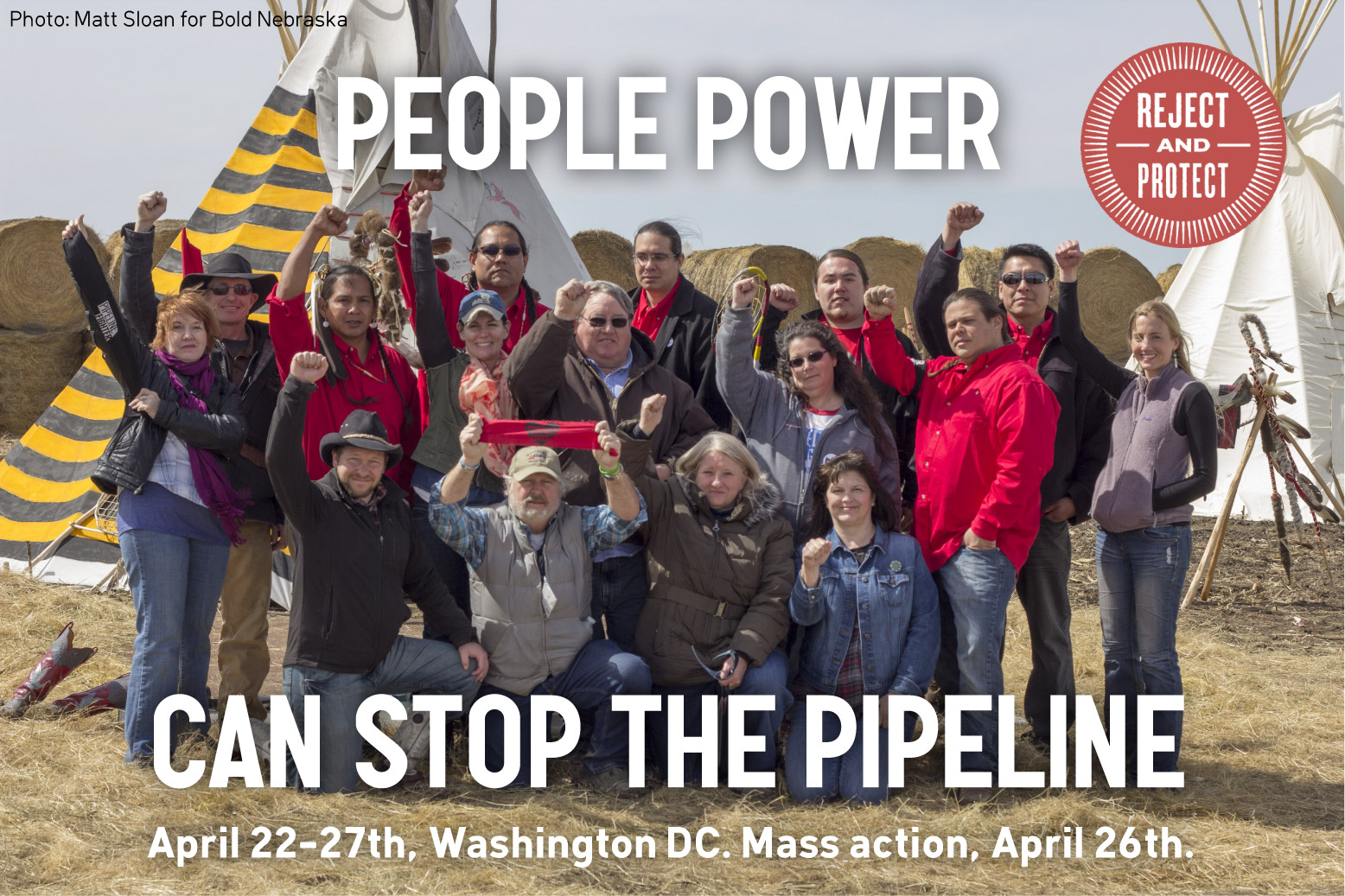

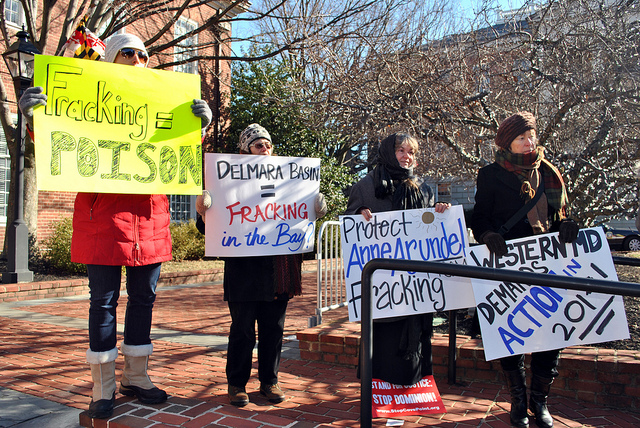
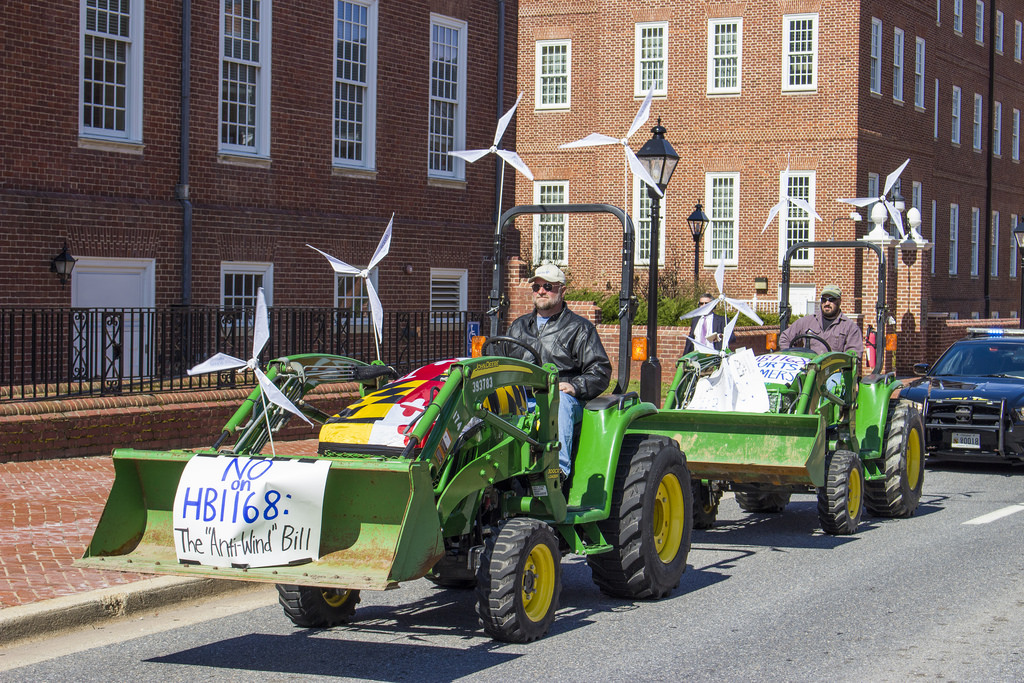
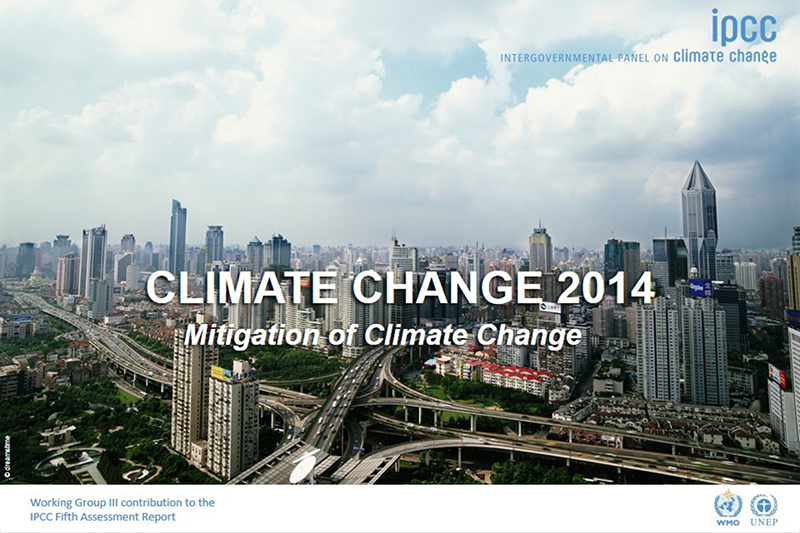
 The Maryland legislative session has come to a close, and not all of the results were positive for Marylanders concerned about the climate and environment. You can see
The Maryland legislative session has come to a close, and not all of the results were positive for Marylanders concerned about the climate and environment. You can see 

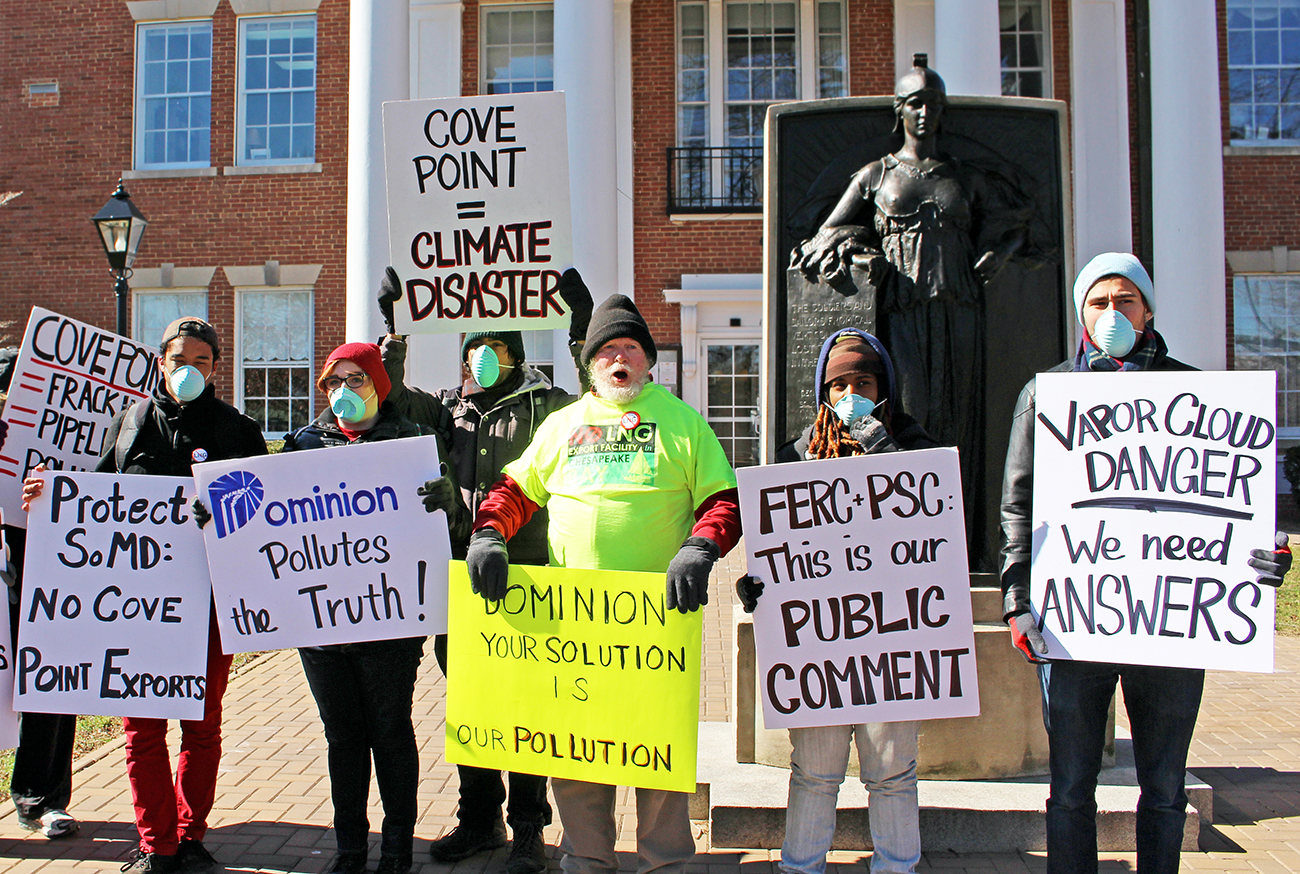
 Lusby, Maryland
Lusby, Maryland




